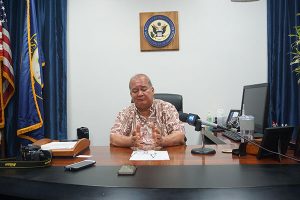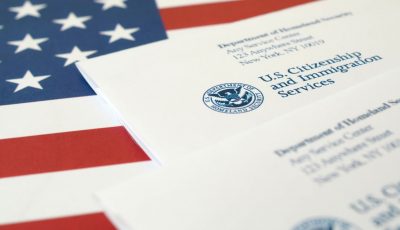Kilili: House to tackle CW bill next week

“This is something that the government leaders here don’t seem to get, as when I say bipartisan, I am not trying to take credit,” said Delegate Gregorio Kilili C. Sablan (Ind-MP) at a news conference yesterday at his office in Susupe (BEA CABRERA)
Delegate Gregorio Sablan-Kilili (D-MP) is anxious to face Congress when it resumes session next week so that he and U.S. Rep. Rob Bishop (R-UT) can work on the passage of a newly introduced bill to extend the CNMI’s foreign worker program past 2019 and raise the number of slots for next fiscal year.
“Chairman Bishop and I…want to act quickly [on H.R. 5986 or the U.S. Workforce Act of 2018] when Congress returns next week,” said Sablan in a news briefing at his office yesterday. “I know everyone here is anxious because I am.”
Bishop is chairman of the House Natural Resources Committee.
Bishop introduced H.R. 5986 over the weekend, with Sablan as co-sponsor, after Sen. Lisa Murkowski’s bill, also known as S. 2325 or the U.S. Northern Marianas Workforce Act, got snagged by a parliamentary problem in the House.
“Sen. Murkowski’s bill got hung up because the Trump administration wanted an anti-fraud fee, which is understandable, given all the problems with the ghost permits and people coming in as tourists to actually work. That was going on at the time that we were working on the bill,” Sablan said.
“We knew about the bill having this ‘blue slip’ issue. It’s a constitutional issue wherein bills having revenues or increasing revenues has to originate from the House…The House Parliamentarian has ruled that the anti-fraud fee is a revenue… it’s a Ways and Means issue and there was just no way that we could work on the Murkowski bill,” he added.
According to Sablan, their other option was to use the bill he earlier introduced in the U.S. House—essentially a copy of Murkowski’s bill—after making the necessary revisions.
“We could have used my bill to make the change, pass it, and send it back to the Senate if the language is exactly the same then it shouldn’t be a problem. But we have to realize that the Workforce Act is an immigration bill and we have been able to treat it as a territories bill that it stays in Natural Resources,” he said.
Sablan said that various agencies, including the Department of Homeland Security and the current administration asked for the anti-fraud requirement.
“It is basically the same language but we rewrote the anti- fraud fee. In the beginning, it was just for DHS but now it’s for DHS, U.S. Department of Labor, and State Department because they have functions in this as they are involved in the process of the CW petitions where the interview if performed in the country of origin of the worker. They are going to share the $50 fee,” he added.
Sablan emphasized the importance of having the bill be a bipartisan measure.
“This is something that government leaders here don’t seem to get when I say bipartisan. I am not trying to take credit. Although the Marianas congressional office drafted the original bill that Sen. Murkowski introduced in the Senate and I introduced in the House, I just know how important…a bipartisan bill is because, if it’s not a bipartisan bill, the Democrats will not let it through the Senate,” he said.
Sablan is confident that the bill will head to the Senate after passing through the House next week.
“Now we have to pass the bill in the House where we need two-thirds vote of the majority of the members holding present and voting. Right now we have 430 members and five vacancies, so two-thirds is about 288,” he said.
He expects the bill to be smooth sailing in the U.S. Senate as “they already passed it before.”



























